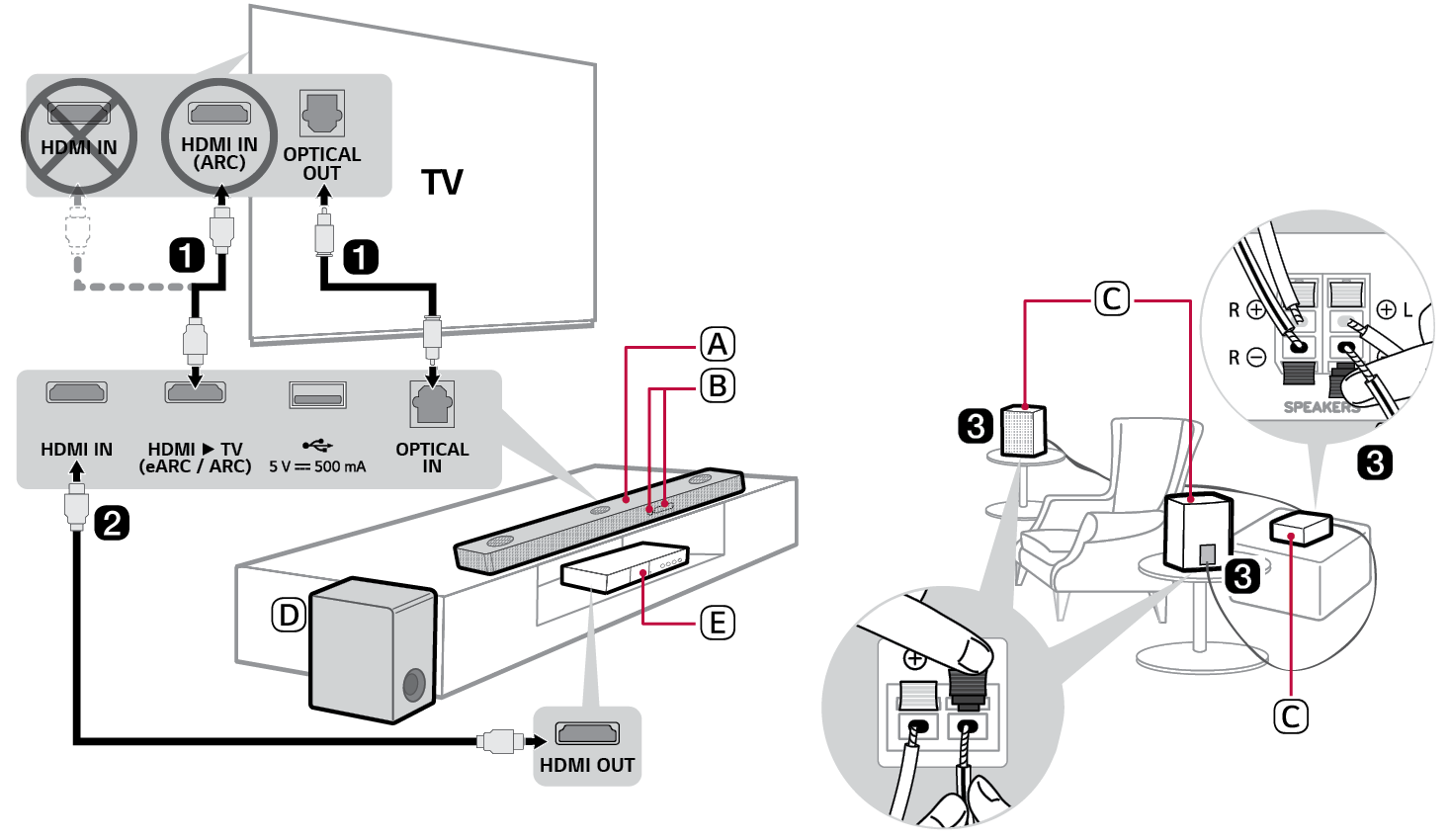Sound Bar Quick Guide
Installing and using the Product
- a Connect the sound bar to your TV via an optical cable or an HDMI cable.


- A Sound bar
- B Remote Control Receiver / Status Display
- C Rear Speakers / Wireless Receiver
- D Wireless Subwoofer - Install it close to the sound bar.
- E External Device - (Blu-ray player, game console, etc.)
- b If you are using an external device (ex. Blu-ray player, game console, etc.), connect it to the sound bar via an HDMI cable.
- c Connect to power in the following order: wireless subwoofer [ wireless receiver [ sound bar. Then, turn on the sound bar. When the connection is automatically established with the sound bar, the LEDs on the wireless subwoofer and the wireless receiver will light up green. ([ See “Connecting the Product” on page 6.)
- d Using the product with your TV ([ See “Connecting with an Optical Cable”, “Connecting with an HDMI Cable”, “Connecting via Bluetooth” on page 43, 45, 47.)
-
A Press the Function
 button repeatedly until “OPT/HDMI ARC” appears on the status display.
button repeatedly until “OPT/HDMI ARC” appears on the status display. - B On your TV's settings, set the output speaker to [HDMI ARC], [Optical], or [External Speaker].
- C When the TV is properly connected to the product, “OPT”, “ARC”, or “E-ARC” will appear on the status display with a sound.
- e Connecting the product to your smartphone via Wi-Fi ([ See “Connecting with a Smartphone via Wi-Fi” on page 26.)
- A Connect your smartphone to Wi-Fi.
- B Install the LG Sound Bar app on Google Play or the App Store.
- C Run the LG Sound Bar app and follow the instructions.
- D The product will connect to your smartphone and you can control the product with LG Sound Bar app.
- f Connecting the product to your smartphone via Bluetooth ([ See “Connecting via Bluetooth” on page 51.)
-
A Tap the Settings
 button on your smartphone and select
button on your smartphone and select  Bluetooth. Turn on the Bluetooth function. (
Bluetooth. Turn on the Bluetooth function. ( Off >
Off >  On)
On) -
B Press the Bluetooth pair
 button. After a moment, you will see “BT READY” on the status display.
button. After a moment, you will see “BT READY” on the status display. - C Find and tap “LG_Speaker_DS80QR_XXXX” or the name you registered on the Google Home app.
- D When the product is connected to your smartphone via Bluetooth, you can see the status display change from “PAIRED” [ “Connected Bluetooth device name” [ “BT”.
Manually connecting the sound bar to the wireless subwoofer or wireless receiver ([ See “Connecting the wireless subwoofer manually”, “Manual connection” on page 8, 10.)
If you see a red LED on the back of the wireless subwoofer or on the front of the wireless receiver, it means that the sound bar is not connected to the speakers. If this is the case, connect them in the following order.
-
A Press the Power
 button on the sound bar to turn it off.
button on the sound bar to turn it off. - B Press the PAIRING button on the back of the disconnected wireless subwoofer or wireless receiver. Check if each LED blinks green.
- If you still see a red LED on the back of the wireless subwoofer, press and hold the button on the back of the subwoofer again.
-
C Press the Power
 button on the sound bar to turn it on.
button on the sound bar to turn it on. - D When the connection is established, you will see a green LED light on the back of the wireless subwoofer or on the front of the wireless receiver light up green.
Table of Contents
Sound Bar Quick Guide
2 Installing and using the Product
Installation
6 Connecting the Product
12 Enjoying enhanced sound
26 Connecting with a Smartphone via Wi-Fi
30 Resetting the Product
Exploring the Product
31 Front
33 Back
34 Exploring Remote Control
Connecting to the TV
43 Connecting with an Optical Cable
45 Connecting with an HDMI Cable
47 Connecting via Bluetooth
Connecting to an External Device
48 Connecting with an HDMI Cable
50 Connecting with an Optical Cable
Using the Product as an Audio System
51 Connecting via Bluetooth
54 Connecting to a USB Storage Device
56 Using the LG Sound Bar app
57 Compatible with Google Assistant
58 Works with Apple AirPlay
59 Spotify Connect
60 Works with Alexa
61 Tidal Connect
Mounting the Product to a Wall
62 Checking before mounting to a wall
64 Mounting the Product to a Wall
Safety Precautions
66 Safety and Regulatory
Before Reporting Product Malfunction
69 Troubleshooting
Appendix
75 Specifications
77 Registered Trademarks and Licenses
79 What You Need to Know about Network Services
79 Open Source Software Notice Information
80 Handling the Product
Installation